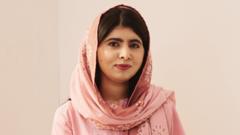Nobel laureate Malala Yousafzai reflects on the rapid decline of women's rights in Afghanistan, drawing from her own harrowing experiences and emphasizing the resilience of Afghan women as she works to raise awareness through film.
Malala Yousafzai: A Voice for Afghan Women’s Rights in Troubling Times

Malala Yousafzai: A Voice for Afghan Women’s Rights in Troubling Times
Malala addresses the alarming erosion of women's rights in Afghanistan under Taliban rule.
Malala Yousafzai, a global advocate for women's rights, has issued a heartfelt plea concerning the grim situation for women in Afghanistan since the Taliban's resurgence. Just a few years after the Taliban retook control, women have witnessed profound restrictions, with even singing now banned. Having herself survived a targeted shooting by the Taliban in Pakistan back in 2012, Malala has committed her life to advocating for education and equality.
“My initial disbelief at how easily women's rights could be compromised has profoundly affected me,” she shared in an interview with the BBC Asian Network. Reflecting on the crushing reality facing many Afghan girls, she noted, “A lot of girls find themselves in a very hopeless, depressing situation where they do not see any escape. The future looks very dark to them.”
Following the Taliban's rise to power in 2021 after two decades of a US-led intervention, the imposition of “morality laws” has severely curtailed women's freedoms. From dress codes to restrictions on travel without a male guardian, the UN has decried these actions as amounting to "gender apartheid” — a term human rights organizations are urging be recognized as a violation of international law. The Taliban defends its policies as reflective of Afghan traditions, insisting that the international community respect their interpretation of Islamic principles.
In an effort to shed light on the plight of Afghan women, Malala has taken on the role of executive producer for a new film titled "Bread & Roses." This documentary follows the lives of three Afghan women — Zahra, a dentist deprived of her practice; activist Taranom, who escapes the country; and Sharifa, a government employee losing her livelihood — reflecting the stories of countless women suffering under the Taliban's rule.
“Women lost everything,” Malala lamented, stating that the Taliban understands that stripping away women's rights begins with education. Since their takeover, over a million girls have been barred from schooling, resulting in dire implications such as increased child marriages and maternal health risks.
The documentary's director, Sahra Mani, aims to document the extraordinary resilience and courage of Afghan women. She noted that conditions have deteriorated so drastically since filming of the protests began that similar endeavors today would be impossible. “Women who once demonstrated for their rights are now facing a harsher reality,” she stated.
Despite the immense difficulty faced by these women, Malala emphasized their resistance: “They are putting so much at risk. It's our time to be their sisters and supporters.” The ambitious film, aimed at raising international awareness, will be released on Apple TV+ on November 22.
Both women hope that raising visibility for these narratives will contribute to global pressure on the Taliban to restore women's rights. Malala is motivated by a deep sense of responsibility to ensure that the plight of Afghan women does not fade from public consciousness. “If they can muster the courage to stand up against this regime, we should learn from them,” she said, calling for solidarity as they continue their fight for freedom.
The film title, inspired by an Afghan saying, symbolizes the quest for empowerment and independence among women: “Finding your bread means you are the master of your destiny.” Sahra and Malala firmly believe that, through perseverance and collective action, Afghan women will reclaim their rights.




















